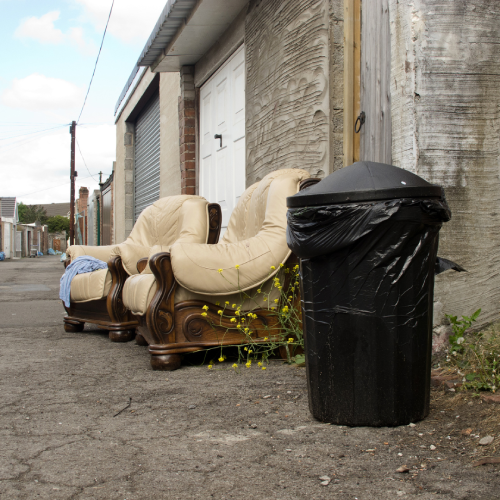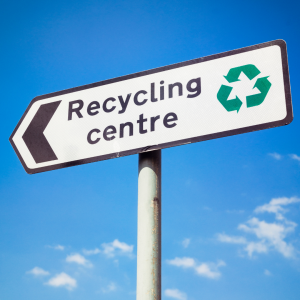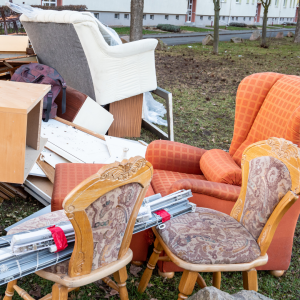Lets work together



Suite 3A, Chapel Allerton House, 114 Harrogate Road, Leeds, LS7 4NY
ukinfo@integrated-skills.com
+44 (0) 3300 888 670

Local Authorities are facing tough times when it comes to waste collection. With Simpler Recycling reforms and a requirement for food waste collections, many councils are struggling to find the budget needed to comply.
In January or 2023, new regulations came into force regarding the handling of POPs (persistent organic pollutants). The Government made it illegal for these materials to be collected and recycled alongside other refuse or bulky waste. These potentially dangerous materials must now be separated into their own refuse stream.
Here we’ll be discussing the challenges this poses for local authorities, as well as exploring the potential increase in revenue that could be generated if appropriate in-cab technology is utilised.

POPs, or “persistent organic pollutants” are organic compounds that are resistant to degradation. As such, they don’t break down easily and can remain in the environment for decades, accumulating in living organisms and ultimately entering the food chain. Toxic to humans and animals, exposure has been linked to serious health issues.
Unfortunately, these substances are often found in upholstered furnishings. This is usually due to the presence of decabromodiphenyl ether (decaBDE), a flame-retardant chemical widely used until it was banned in 2019.
While these furnishings are in-use, there is no apparent health risk, but if the items are damaged through the waste management process, the compounds can break down and release potent chemicals into the atmosphere.
Likely items to contain POPs include sofas, armchairs, upholstered dining room chairs or garden furniture, bean bags and cushions, children’s car seats and highchairs. All these items (plus any other upholstered items that would be used as a form of seating within a household environment and to which fire regulations apply) fall under the 2023 legislation.
The new legislation was written by the Environment Agency and refers to “upholstered domestic seating containing Persistent Organic Pollutants”. It came into force on the 1st January 2023 and laid out rules for local authorities to follow when storing or disposing of such items.
Effectively, the rules prohibit any items likely to contain POPs being handled in the same stream as non-POP items. This includes the storing, collection, transporting, handling and treatment of the items. They must be kept completely separate and recycled appropriately to avoid the risk of pollution.
Local Authorities are also expected to treat any and all upholstered seating with the assumption that it does in fact contain POPs.
It’s well known that local council budgets are stretched and that other recent changes to waste-handling legislation have already stretched them further. The rules on POPs have added a further weight to the load local authorities are carrying.
The Local Government Association (LGA) were quick to respond in May of 2023: “Council operations are not designed to cope with this level of complexity, and household waste and recycling facilities, for example, could need significant upgrades.”
They called for clarity around guidance for how private sector contractors and volunteers should handle these items to avoid the local councils bearing further collections. They also requested information around how the costs of high temperature incinerators, hazardous waste landfill sites and safe, underground storage would be met.
Bulky waste collections are already an expensive service for local authorities to provide. Some charge a fee for collections, creating a small income stream that helps to shore up the costs.
Collecting bulky waste is also logistically tricky- especially for councils in urbanised areas. High-rise blocks are a particular issue as items need to be left outside on a certain weekday to be collected. This can lead to large amounts of waste being left in car parks or on the street due to the number of residents in one building. It also presents issues for those with lesser mobility or no access to a lift and can encourage fly-tipping as residents see items left outside and follow suit.
Councils can charge for bulky waste and POP collections, but it’s unlikely that charges deemed reasonable by the public will cover the full cost of handling such materials.
A scheme in Leeds managed to subsidise their costs by almost 24%. They made the first collection free (for up to 5 items) before charging £30 per collection thereon (up to a maximum of 3).
A council spokesperson said: “Providing this service to households across Leeds costs £710k a year. This includes all the operational costs (staff, vehicles etc) and waste disposal charges so that nothing goes to landfill. It is estimated introducing a £30 charge for repeat bookings will raise £169k a year to help subsidise this cost and reduce the pressure on the overall council budget.”

Modern in-cab technology will be key to clawing back the costs associated with bulky waste and POP collections. Route optimisation software is the first port of call; creating dynamic routes to reduce fuel costs and maximise vehicle capacity. Making routes more efficient and profitable is key.
In-cab verification and photography that allow drivers to log items as containing POP and to rearrange their collection or to take before and after images as proof of collection will also be key. These same cameras can be used to identify additional items not yet registered for collection at a location and even produce an instant quote for a revisit and collect.
CEO of Integrated Skills, Alan Paget, hopes for future AI integrations: “We’re assessing the potential for using vehicle-based AI to assess the size and weight of bulky items at the point of collection to ensure that vehicles aren’t overloaded.”
The LGA have stated that, longer-term, producer responsibility will have to come into play. This would see the responsibility for bulky waste and POPs move to the manufacturers producing the items. IKEA have already shown willing on this front and offer to take customer’s old sofas away when delivering a new one.
For individuals who would like to avoid the cost of arranging for council collections, there is always the option to take items directly to your local tip. For those without their own transport or who are physically impaired in some way, this is not an option and council collections will be relied upon for the foreseeable future.
Integrated Skill’s Business Development Director, Stuart Henshaw, will be forming part of the Municipal Stage panel at this year’s Resource and Waste Management Expo. All things bulky waste, POPs and general municipal waste and recycling will be up for discussion.
You can also find Stuart and the team at our stand (CT-H230). Join us at the Birmingham NEC, 11th-12th September 2024 and feel free to bring a list of questions- we’ll be happy to help.
Would you like to know more about Innovation Drives Bulky Waste Collections? Fill in your details below and let us know how we can help.
Website Designed & Built by we are CODA